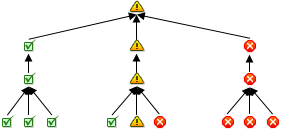Progress of a task and progress aggregation
After creation of a task, its progress is set to as
scheduled  . As soon as a task is started, the
expected completion date is computed as start date plus expected duration. If
this expected completion date is later than the user-defined deadline, the
progress of the task is set to critical
. As soon as a task is started, the
expected completion date is computed as start date plus expected duration. If
this expected completion date is later than the user-defined deadline, the
progress of the task is set to critical  . When the deadline is
passed, the progress is set to overdue
. When the deadline is
passed, the progress is set to overdue  .
.
Note: The
task icons  ,
,  and
and
 , which are used in folder listings,
do not symbolize the temporal progress of a task, but indicate specific
details of its execution:
, which are used in folder listings,
do not symbolize the temporal progress of a task, but indicate specific
details of its execution:  stands for a task that has been
finished or completed,
stands for a task that has been
finished or completed,  indicates a roll-back in task
execution like e.g. an objection to task results, and
indicates a roll-back in task
execution like e.g. an objection to task results, and  finally stands for a task that
has been cancelled and has to be restarted, if at all (also see 8.1.8 Handling exceptional task
situations).
finally stands for a task that
has been cancelled and has to be restarted, if at all (also see 8.1.8 Handling exceptional task
situations).
In order to be visible also on phase and project level, the progress of subordinate tasks is aggregated from lower levels upward according to the project structure, if progress on phase and project level has been set to system-determined (see 8.1.1.2 Progress of a project).
The following rules govern the aggregation of progress (also see Figure 30):
o If the progress of all subordinate tasks is as scheduled, critical or overdue, the progress of the task, phase or project directly above in the project structure is also set to as scheduled, critical or overdue, respectively.
o If the progress of the subordinate tasks is a mixture of as scheduled, critical and overdue, the progress of the task, phase or project directly above in the project structure is set to critical.

Figure 30: Progress aggregation
Progress aggregation is carried on from lower levels of the project hierarchy to the project level. Also on phase level, it follows the same rules. There are, however, the following restrictions and exceptions:
o The progress of a subtask is only aggregated to its main task if the main task is dependent on the subtask’s execution.
o If the progress of a task is overdue, the progress aggregated from eventual subtasks is not taken into account and the progress of the task remains overdue.
o If the progress of a task is critical, but the progress of all subtasks is as scheduled, the progress aggregated from the subtasks is not taken into account and the progress of the task remains critical.
o If a user explicitly changes the progress of a phase or project, the progress of this phase or project is no longer changed by aggregation; the user-defined progress value has priority.